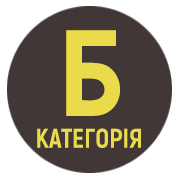THE THEMATIC GROUP «NAMES OF FUTURE PROFESSIONS» IN THE MODERN UKRAINIAN LANGUAGE
DOI:
https://doi.org/10.32782/folium/2024.5.2Keywords:
vocabulary, terminology, semantic motivation, borrowing, grammatical meaning, syntactic models, names of future professionsAbstract
In the article, the author analyses the names of future professions in the modern Ukrainian language (160 units) and considers them as a layer of vocabulary that can potentially be included in Ukraine's official business terminology system. It has been emphasised: that the thematic group has a semantic community, but a heterogeneous composition in terms of origin and syntactic structures. It has been clarified: at the semantic level, there are mandatory semes that indicate the type of human activity. These terms may be present in the current classification of professions (designer, expert, engineer) or absent from it (regulator, creator, urbanist); the latter are novelties, the terminology of which has the character of reinterpretation of meanings that are not recorded in dictionaries. Possible invariant semes (management, production), emphasise the industry, the field of profession or auxiliary semes that specify the meaning of the reference word in relation to the specifics of the profession. The group includes borrowings from Western European languages, and productively added English American vocabulary. It has been accentuated: this foreign language vocabulary is mainly fixed by dictionaries and the national classifier of professions, however, in the names of professions of the future, they are used to name types of work oriented to the newest spheres of human activity. According to the grammatical meaning, simple names and keywords of phrases are common masculine nouns, and feminitives are irregular formations. One word or a simple or complex word combination is used for the names of future professions. The syntactic models of word combinations are described, namely: simple – substantive word combinations with a subordinating conjunction of agreement or case agreement (schemes A+S, S+S1). Complex word combinations names are formed from three or more full words. Three words are built according to the schemes: S+(A+S1), S+(S1+S2), A1+(A2+S). Multi-words contain from four to seven words, most of them contain four (schemes S+(A+S1)+S2, S+(A1+(A2+S1), (S+S1)+(A+S2)). In multi-word phrases the main word names the profession of the future, dependent words (nouns, adjectives) specify the sphere of human activity (schemes (A+S)+(S1+S2+S3), S+(A1+(A2+S1)+(S2+S3+ S4) etc.). In general, the novelties correspond to the system of the Ukrainian language, the elements of the group demonstrate a tendency to complicate semantic and syntactic structures. The author concludes that the actual replenishment of the Ukrainian language with these terms depends on whether these professions will become relevant to Ukraine in the coming decades.
References
Амелін А. 100 професій майбутнього. Київ, Український інститут майбутнього. 2020. URL: http://surl.li/muvgly (дата звернення: 05.09.2024).
Бибик С. П., Сюта Г. М. Словник іншомовних слів. Тлумачення, словотворення та слововживання : близько 35000 слів і словосполучень / за ред. С. Я. Єрмоленко. Харків : Фоліо, 2006. 623 с.
Великий тлумачний словник сучасної української мови / уклад. та голов. ред. В. Т. Бусел. Київ; Ірпінь : Перун, 2005. 1736 с.
Водянка Л., Кифяк В., Філіпчук Н. Поява нових професій на ринку праці в умовах цифровізації економіки. Інфраструктура ринку. 2021. Вип. 52. С. 146–151. DOI: https://doi.org/10.32843/infrastruct52-26.
Етимологічний словник української мови : у 7 т. / О. С. Мельничук (голов. ред.) та ін. Київ : Наукова думка, 1982–2012.
Капченко Л. М., Савченко Н. В., Літвінчук Л. Й., Грамма О. В. Професії майбутнього для України : наук.-практ. розробка. Київ : ІПК ДСЗУ, 2017. 47 с. URL: https://is.gd/5Mnwa2 (дата звернення: 10.09.2024).
Краус Н., Краус К., Манжура О. Професії майбутнього у віртуальній реальності інноваційно-цифрового простору. Бізнес Інформ. 2019. № 1. С. 132–138.
Національний класифікатор професій. Наказ Держспоживстандарту України від 28.07.2010 р. № 327. Київ, 2010. URL: https://is.gd/gYgUCA (дата звернення: 05.09.2024).
Нелюба А., Редько Є. Лексико-словотвірні інновації : словник / заг. ред. А. Нелюби. Харків : Харківське історико-філологічне товариство, 2015. 220 с.
Нестеренко Т. До проблеми творення й уживання фемінітивів у сучасному українському дискурсі. Актуальнi питання гуманітарних наук. 2021. Вип. 36, т. 2. С. 159–165. DOI: https://doi.org/10.24919/2308-4863/36-2-25.
Підкамінна Л. Неологізми в назвах професій у сучасній українській мові. Закарпатські філологічні студії. 2022. Т. 2, Вип. 24. С. 7–11. DOI: https://doi.org/10.32782/tps2663-4880/2022.24.2.1.
Про затвердження Зміни № 9 до національного класифікатора ДК 003:2010. Наказ Міністерства економіки України № 1574 від 8.08.2020. URL: https://tinyurl.com/yeh2r9sx (дата звернення: 05.09.2024).
Професії майбутнього: 30 найбільш перспективних спеціальностей. BIZMAG. 2023. URL: https://is.gd/KfpMf3 (дата звернення: 05.09.2024).
Санковська І. М. Путівник світом кліматичних професій : посібник з професійного інформування. Вінниця : ТВОРИ, 2023. 70 с.
Словник іншомовних слів / уклад. С. М. Морозов, Л. М. Шкарапута. Київ : Наукова думка, 2000. 680 с.
Словник української мови : в 11 т. / за ред. І. К. Білодіда. Київ : Наукова думка, 1970–1980.
Словник української мови : у 20 т. / гол. наук. ред. В. Русанівський. Київ : Наукова думка, 2010–2023. Т. 1–13. URL: https://sum20ua.com (дата звернення: 11.09.2024).
Стишов О. Особливості суфіксального словотворення неологізмів на позначення осіб у сучасній українській мові. Лінгвістичні дослідження. 2020. № 53. С. 127‒140.
Ходарєва І. М. Семантична адаптація запозичених професійних імен у сучасній українській економічній термінології. Priority directions of science and technology development. Proceedings of the 9th International scientific and practical conference. SPC “Sci-conf.com.ua”. Kyiv, Ukraine. 2021. С. 946–952.
Шевченко Л. І., Сизонов Д. Ю. Нові слова та фразеологізми в українських масмедіа : словник / відп. ред. Л. І. Шевченко. Київ : ВПЦ "Київський університет", 2022. Ч. 5. 359 с.











